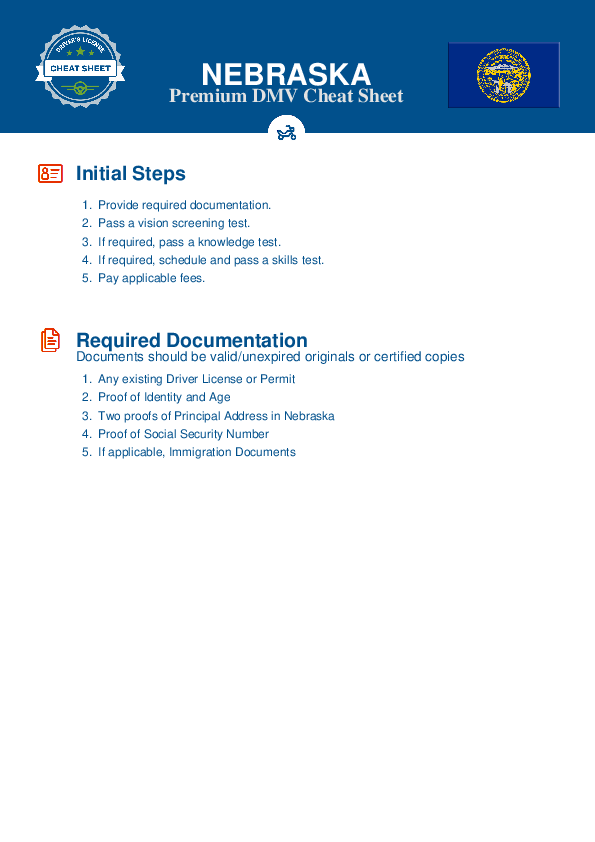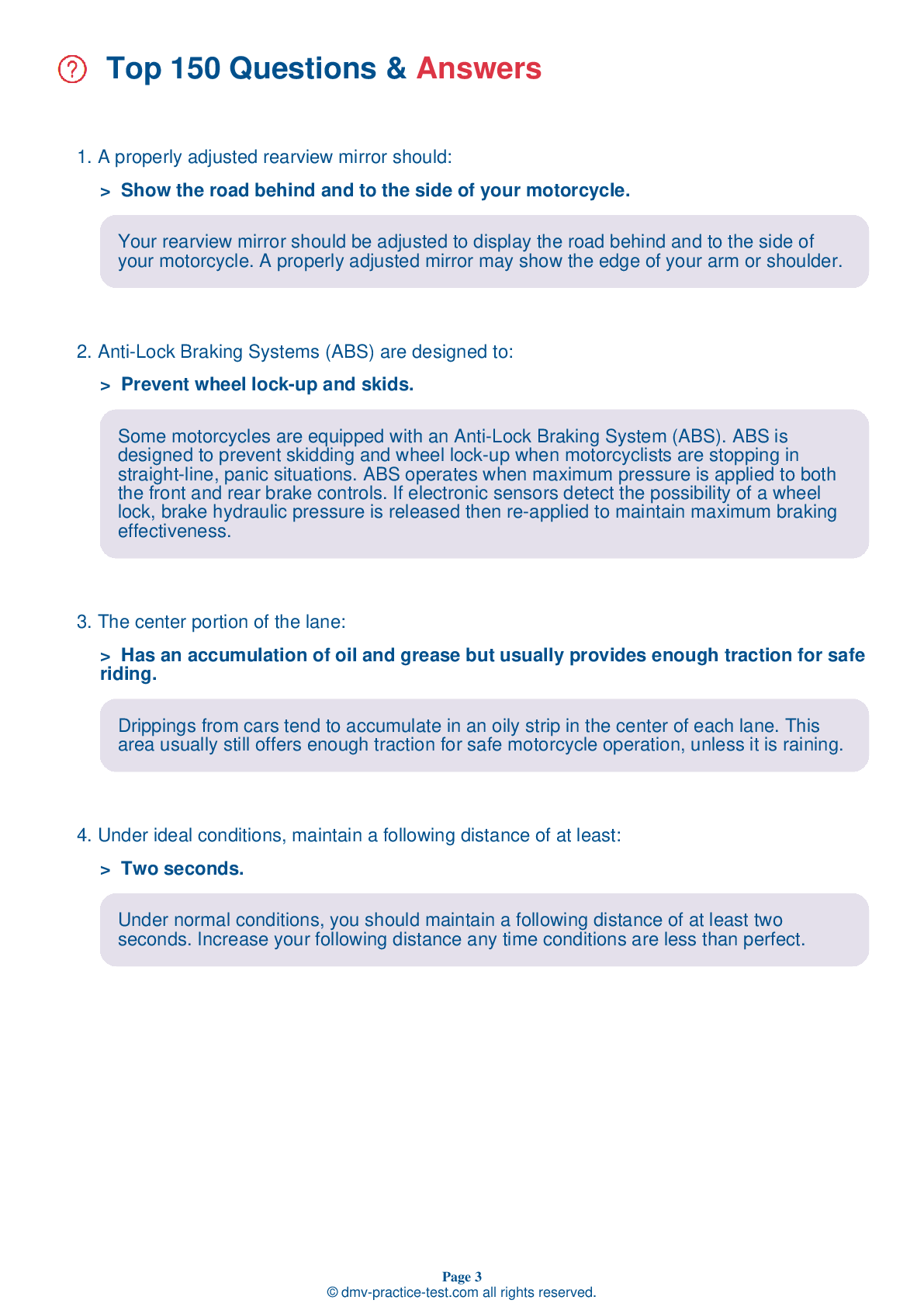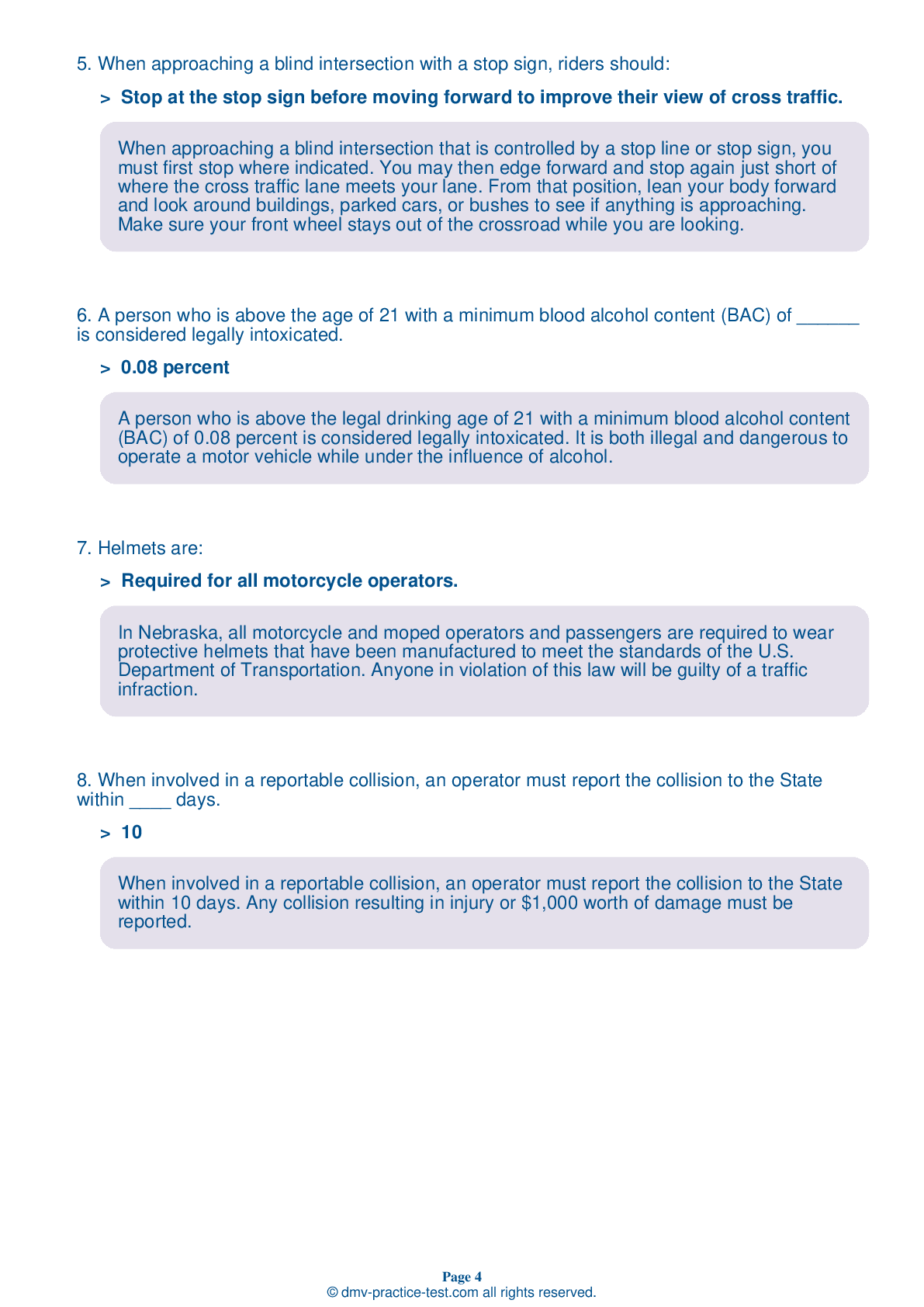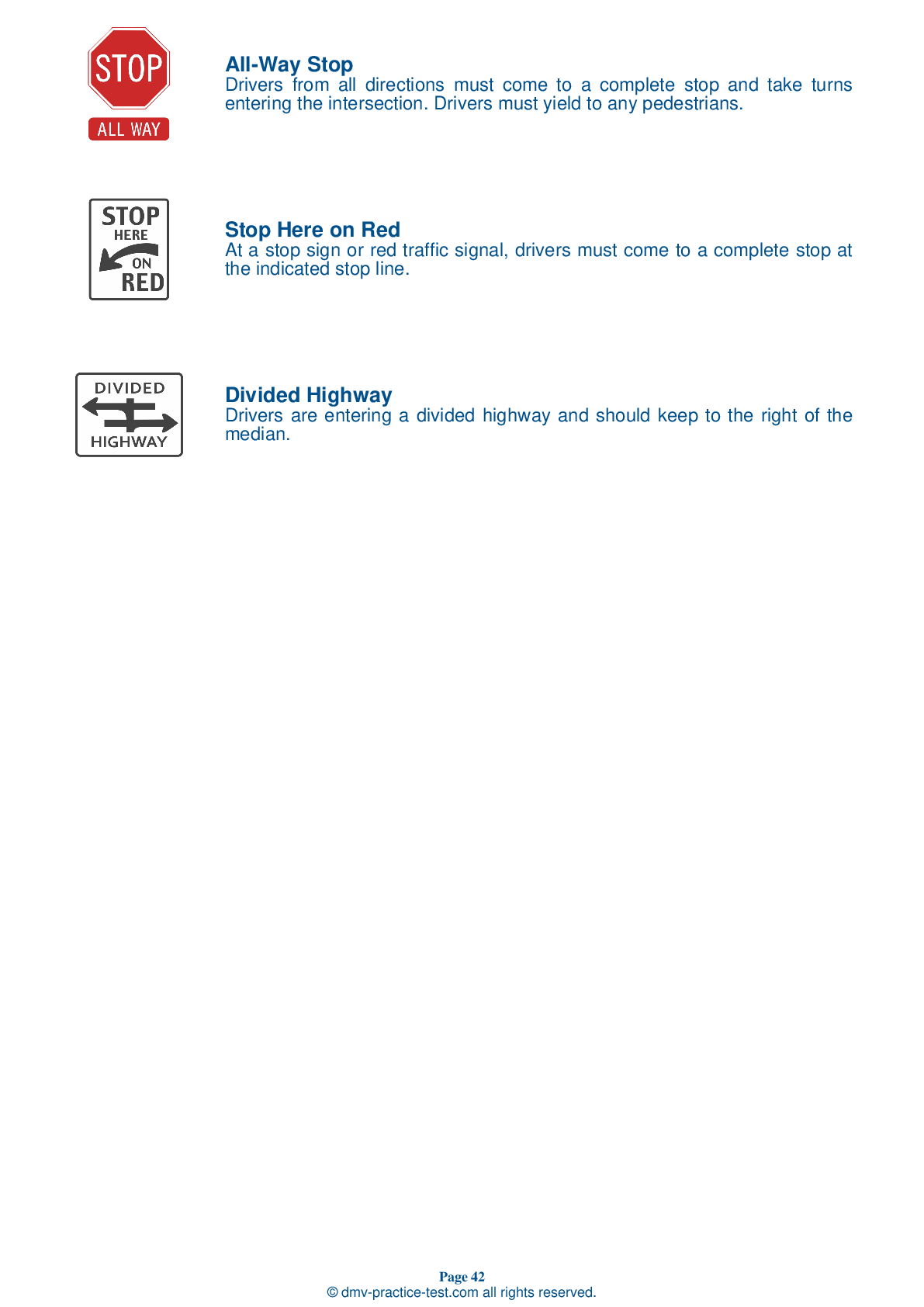DMV Permit Test #12
Motorcycle Test | License NE 2026 | FREE Online Practice! #12 Page 3 of 4
Take this FREE motorcycle test (license in NE 2026) to check your knowledge of the road rules. To improve your results, download a motorcycle handbook online, study theory, and practice for free on our website. Still worried about how to get a motorcycle license in Nebraska in 2026? Check our website for more sample tests, train as much as possible, and boost your grades!
25
20
16
13 . While accelerating a motorcycle with a sidecar, you should:
Steer sharply in the direction opposite the sidecar.
A sidecar adds additional weight to one side of your motorcycle. During acceleration, steer slightly in the direction opposite the sidecar to maintain a straight line path.
14 . In areas where dangers could be present, a motorcyclist should:
In high-risk areas, such as intersections, shopping areas, schools, or construction zones, a motorcyclist should reduce their speed. They should cover the clutch and both brake levers to reduce their reaction time in the case of an emergency.
15 . When a group of riders is passing another vehicle on a two-lane road, the riders should:
Pass at one time as a group.
On a two-lane road, a group of motorcyclists should pass one at a time. Each motorcyclist should complete the pass before another begins to pass.
16 . When approaching multiple hazards at one time, you should:
Identify and separate the hazards.
When approaching multiple hazards at one time, you must be able to identify and separate the hazards. If possible, react to and safely pass one hazard before dealing with the next.
17 . This road sign means:
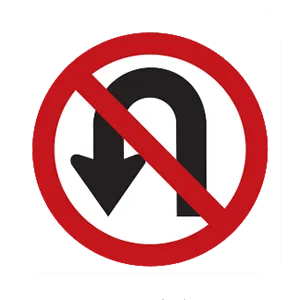
Regulatory signs provide notice to road users of traffic laws that must be obeyed. This sign tells drivers that it is prohibited to make a U-turn.
18 . When approaching a blind intersection with a stop sign, riders should:
When approaching a blind intersection that is controlled by a stop line or stop sign, you must first stop where indicated. You may then edge forward and stop again just short of where the cross traffic lane meets your lane. From that position, lean your body forward and look around buildings, parked cars, or bushes to see if anything is approaching. Make sure your front wheel stays out of the crossroad while you are looking.
2026 Nebraska | Frequently Asked Questions
In Nebraska, to acquire a motorcycle license, you must first hold a Provisional Operator's Permit (POP) or an Operator's License. You then have to pass a motorcycle safety course or a written and drive test at a DMV office. If you're under 18, you must have a POP for at least 12 months and no traffic violations in the last six months.
In Nebraska, the minimum age for obtaining a motorcycle driver's license is 17. However, applicants who are under 18 years old are required to complete a state-approved motorcycle safety course and have parental consent before they can apply for a motorcycle license or endorsement.
Yes, in Nebraska, you need a dedicated motorcycle license or a Class M endorsement on your regular driver's license to legally ride a motorcycle. To get this, you must pass a vision test, a written knowledge test, and a drive test. However, if you complete an approved motorcycle safety course, the testing requirements may be waived.
To apply for a motorcycle driver's license in Nebraska, you need to present several documents: proof of identity (like a birth certificate or passport), proof of Social Security number, two proofs of Nebraska residential address, and proof of U.S. citizenship or lawful status. If you're under 18, parental consent is also required.
Yes, in Nebraska, you will need to take a written exam to obtain a motorcycle license. However, if you successfully complete a state-approved motorcycle safety course, the written and drive test requirements may be waived. It's recommended to study the Nebraska Motorcycle Operator Manual to prepare for the written exam.
The Nebraska motorcycle written test covers a wide range of subjects related to safe motorcycle operation. These include understanding road signs and signals, rules of the road, safe riding techniques, how to handle hazardous conditions, and protective gear. It also tests knowledge on motorcycle-specific laws in Nebraska. Studying the Nebraska Motorcycle Operator Manual is recommended.
Yes, in Nebraska, if you successfully complete a Motorcycle Safety Foundation (MSF) rider course, you can waive the written and drive tests required for motorcycle endorsement. However, you need to submit your MSF course completion card to the DMV within one year of the course completion date.
To enroll in a motorcycle training course in Nebraska, you need to contact an approved training provider. These are often found at community colleges or private companies. You will likely need to pay a fee, which varies by provider. The course usually includes classroom instruction and practical riding exercises. Upon completion, you may be exempt from the DMV's written and road tests.
No, you don't need to own a motorcycle for the license test in Nebraska. You can use any motorcycle that's street-legal and in safe working condition, as long as you have permission to use it. However, you're responsible for bringing the motorcycle to the test site. Make sure it's insured and registered before the test.
Yes, you can use a friend's motorcycle for the driver's license evaluation in Nebraska. However, the motorcycle must be street-legal, registered, and insured. You'll also need to bring proof of insurance to the test. Remember that you must be comfortable and familiar with the motorcycle for the best chance of passing the test.
Yes, during the Nebraska motorcycle driving exam, you're tested on specific handling skills. These include your ability to start and stop, turn and swerve, balance, negotiate intersections, and react to hazards. The test also evaluates your understanding of road signs, signals, and rules. It's crucial to demonstrate control and safe driving practices throughout the exam.
Yes, in Nebraska, new motorcycle drivers under the age of 18 are required to hold a Provisional Operator's Permit (POP) for at least 12 months. During this period, they cannot carry any passengers and are prohibited from driving between midnight and 6 AM unless it's for school, work, or a religious activity. They must also remain violation-free during this period.
Yes, your Nebraska motorcycle license allows you to ride a motorcycle in other states. This is due to the Full Faith and Credit Clause of the U.S. Constitution, which requires each state to honor the public acts and judicial decisions of other states. However, while riding in other states, you must abide by their specific traffic laws and regulations.
Yes, in Nebraska, it is mandatory for all motorcycle riders and passengers to wear a helmet. The law applies regardless of age or experience level. The helmet must meet the Department of Transportation's safety standards. This law is in place to protect riders from serious injury in the event of an accident.
Yes, in Nebraska, there are two types of motorcycle licenses: Class M and Class O. Class M is specifically for motorcycles, while Class O is for motor vehicles including motorcycles. Both licenses require passing a written test and a drive test. The type of license you need depends on the specific type of vehicle you plan to operate.
Yes, in Nebraska, you can add supplementary endorsements to your motorcycle license. These endorsements may include additional permissions like operating a school bus, a commercial vehicle, or a motorcycle. Each endorsement requires its own test and certification. It's recommended to check with the Nebraska DMV for specific requirements.
Yes, the Nebraska Department of Motor Vehicles (DMV) provides the motorcycle written test in multiple languages. If English is not your first language, you can request to take the test in your preferred language. It's advisable to contact your local DMV office ahead of time to ensure they have the test in your desired language.
An effective strategy to prepare for the motorcycle license test in Nebraska is to study the state's Motorcycle Operator Manual thoroughly. It contains all the information you need for the test. Also, taking online practice tests can be very helpful as they simulate the actual test environment and help you familiarize yourself with the types of questions asked.
Yes, the motorcycle written exam in Nebraska can be taken in languages other than English. The Nebraska Department of Motor Vehicles offers the exam in Spanish. If you need the test in another language, you should contact the DMV directly to inquire about available translation services or assistance.
Yes, retaking is allowed in Nebraska if you don't pass the motorcycle written test on your first attempt. However, you must wait at least one day before retaking the test. Keep in mind that there may be additional fees for each retest, and the number of attempts may be limited. It's advisable to study thoroughly before each attempt.
